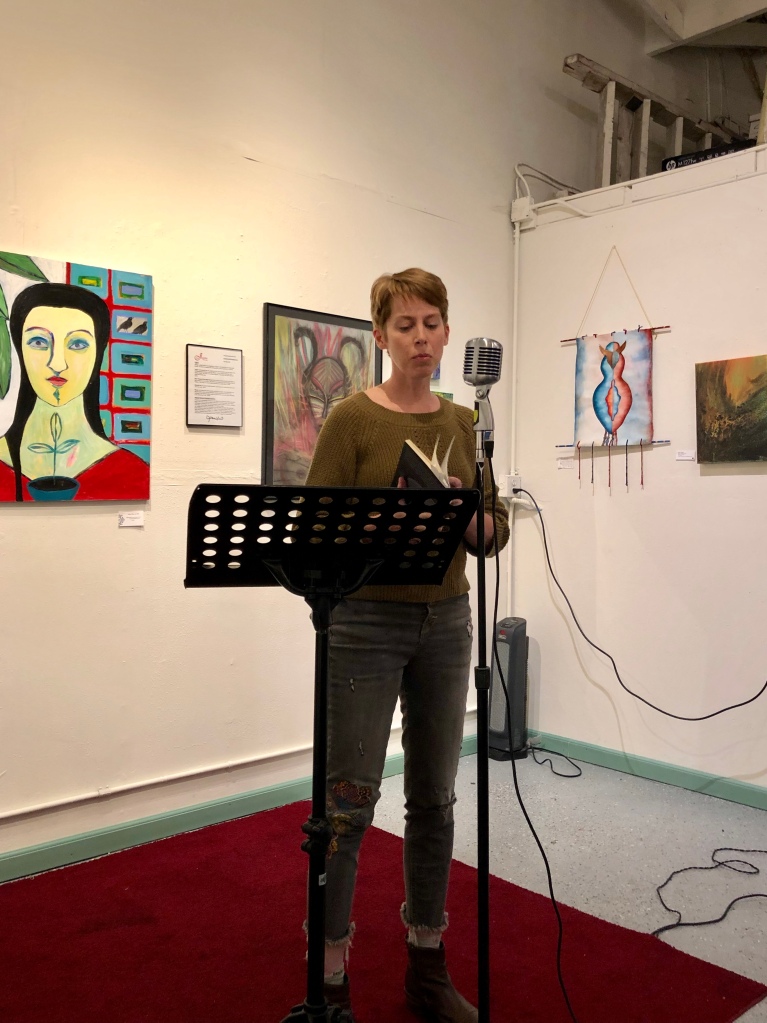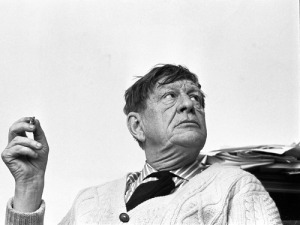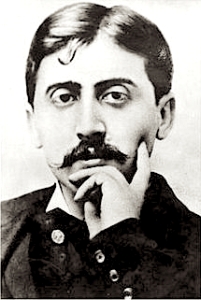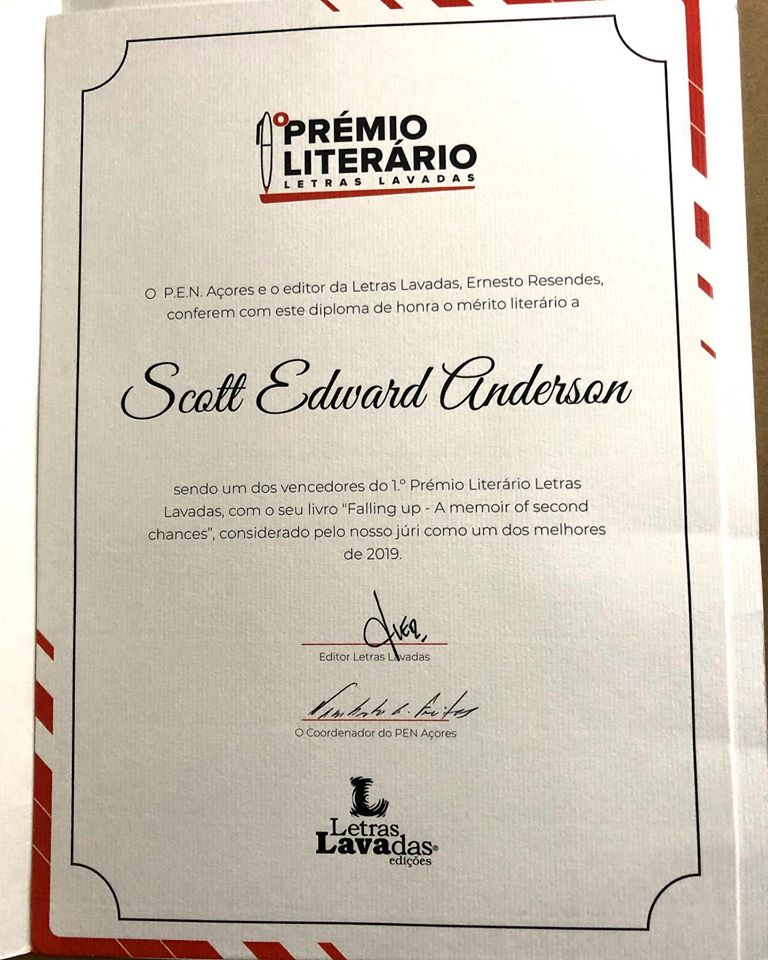
I’d almost forgotten to write my post for Week Four of National Poetry Month when I realized it was the last night of April and poetry month would soon be over for another year. I had no idea what poem or poet to feature although, having recently returned from Fall River, MA, where I had been part of the first Poesia Festival there, I thought it might be one of the Portuguese poets featured at the event: Camões, Silveira, Amaral, Pessoa, or Medeiros. (I’d already featured Sophia de Mello Breyner Andresen the previous week.)
“It can wait until tomorrow,” I told myself, turning on Game 5 of the Boston Bruins Stanley Cup playoff game against the Toronto Maple Leafs, which my team lost in overtime.
This morning, I woke to the news that Paul Auster had died at 77 years old after a long battle with lung cancer. I have a long, tenuous, and tangential relationship with Paul Auster dating back to the late 1980s, when I was part of a writing group called the “Decompositionalists” and worked in publishing. I texted one of the other members of that writing group who had been a big fan of the author of City of Glass. “I still treasure The New York Trilogy,” she texted back. “Something of a shock to learn of his passing, though every time I saw him he was smoking.”
When I was a young editor at Viking Penguin, Auster, in all his swarthy, 38-year-old handsomeness used to come into the office to meet with his editor. All the young women—or, rather, ALL the women would swoon, and many of the men, too! “He is smoking hot,” a colleague at the time explained to me when I asked what the attraction was. “There’s nothing like a smoking hot intellectual to make an editorial department swoon.”
While Auster was best known as a highly acclaimed novelist and writer of prose fiction, memoirs, and essays, he started as a poet and translator, living in Paris after graduating from Columbia in 1969. It wasn’t lost on me that Auster, who had partaken in the student protests at Columbia University in 1968, died the day the NYPD sent in its surge troops to evict students from Hamilton Hall, a building they were occupying as part of a pro-Palestinian protest.
The earlier protest, which police also cracked down upon on April 30th fifty-six years ago, ended in violence that resulted in more than 700 arrests and 148 reports of injuries as “officers trampled protesters, hit them with night sticks, punched and kicked them down stairs,” according to The New York Times.
While Auster’s poetry has been overshadowed by his prose, he published several volumes of poetry over his career, including Unearth (1974), Wall Writing (1976), and Facing the Music (1980). Two volumes of selected poems, Disappearances (1988) and Ground Work (1990) along with a volume of Collected Poems (2007), were also published.
His poetry tends to have an experimental, avant-garde style influenced by French writers and surrealists, wherein, as in much of his fiction, he explores themes of chance, games, language play, intertextuality, and the role of the author. While respected, his poetry has received less mainstream attention and acclaim compared to his novels like 4321 (2017), The New York Trilogy (1987), The Book of Illusions (2002), and The Brooklyn Follies (2005).
Auster rather famously wrote with a fountain pen. “If I could write directly on a computer or typewriter, I would do it. But keyboards have always intimidated me,” he said in an interview with The Paris Review. “A pen is a much more primitive instrument. You feel that the words are coming out of your body, and then you dig the words into the page. Writing has always had that tactile quality for me. It’s a physical experience.”
Auster explores the relationship between the body and language in his poem, “White Nights,” with a characteristic hint of surrealism. RIP Paul Auster (1947-2024). Here is Paul Auster’s poem:
WHITE NIGHTS
No one here,
and the body says: whatever is said
is not to be said. But no one
is a body as well, and what the body says
is heard by no one
but you.
Snowfall and night. The repetition
of a murder
among the trees. The pen
moves across the earth: it no longer knows
what will happen, and the hand that holds it
has disappeared.
Nevertheless, it writes.
It writes: in the beginning,
among the trees, a body came walking
from the night. It writes:
the body’s whiteness
is the color of earth. It is earth,
and the earth writes: everything
is the color of silence.
I am no longer here. I have never said
what you say
I have said. And yet, the body is a place
where nothing dies. And each night,
from the silence of the trees, you know
that my voice
comes walking toward you.
–Paul Auster, from Disappearances: Selected Poems, Overlook Press, 1988
Poet Daisy Fried recently lamented how “very little of [poetry published in the past year] has any sense of fun.” This reminded me of Thomas Lux, one of my favorite poets whose works were often sardonically funny yet possessed a deep poignancy and empathy. Lux was a master at blending humor and pathos to capture the absurdities of the human condition.
Lux played minor subjects in a major key. He was a keen observer, and like a bower bird, he collected quirky details of everyday life into a wide-ranging body of work. The music critic Ted Burke once called him “the Laureate of Unintended Results,” as Lux’s poems often start with a simple observation that spirals into unexpected revelations. He could be tender and funny in the same piece, as in “Upon Seeing an Ultrasound of an Unborn Child,” “I Love You Sweatheart,” or “Tarantulas on the Lifebuoy.”
In 1998, Lux selected my work for the Larry Aldrich Emerging Poets Award. Having grown up on a Massachusetts farm, he seemed drawn to the rural, straightforward voice in my poems about country life. I was fortunate his sensibilities resonated with my writing.
A generous man and masterful live performer, Lux taught for decades at Georgia Tech, holding the Bourne Chair in Poetry. His poem “Refrigerator, 1957” illuminates the juxtaposition of delight and melancholy he captured so well. The opening lines present an ordinary relic of mid-20th century American kitchens — “the jar of maraschino cherries/on the third shelf…” But Lux transforms this mundane image into a profound meditation on the passing of time and the contradictions of memory:
“…I’m eight, and time
is both endless and negligible…”
In reflecting on this ubiquitous 1950s object, the poem evokes the depth of humor, nostalgia, and loss that Lux could unearth from the artifacts of everyday life. His poetry revealed the extraordinary in the ordinary in a voice that, as Daisy Fried yearned for, is undeniably fun.
Here is Tom Lux’s poem:
Refrigerator, 1957
More like a vault: you pull the handle out
and on the shelves not a lot,
and what there is (a boiled potato
in a bag, a chicken carcass
under foil) looking dispirited,
drained, mugged. This is not
a place to go in hope or hunger.
But, just to the right of the middle
of the middle door shelf, on fire, a lit-from-within red,
heart-red, sexual-red, wet neon-red,
shining red in their liquid, exotic,
aloof, slumming
in such company: a jar
of maraschino cherries. Three-quarters
full, fiery globes, like strippers
at a church social. Maraschino cherries, “maraschino”
the only foreign word I knew. Not once
did I see these cherries employed: not
in a drink, nor on top
of a glob of ice cream,
or just pop one in your mouth. Not once.
The same jar there through an entire
childhood of dull dinners—bald meat,
pocked peas, and, see above,
boiled potatoes. Maybe
they came over from the old country,
family heirlooms, or were status symbols
bought with a piece of the first paycheck
from a sweatshop,
which beat the pig farm in Bohemia,
handed down from my grandparents
to my parents
to be someday mine,
then my child’s?
They were beautiful
and if I never ate one
it was because I knew it might be missed
or because I knew it would not be replaced
and because you do not eat
that which rips your heart with joy.
–Thomas Lux
(This poem originally appeared in the New Yorker in 1997, and subsequently in Tom’s New & Selected Poems, published the same year. Here is a recording of Tom reading his poem at the Robert Creeley Awards ceremony in March of 2012: “Refrigerator, 1957”.)
National Poetry Month 2023, Week Four: Hannah Linden’s “My daughter says the ghosts were busy last night”
April 24, 2023
I first read Hannah Linden’s poetry in 2014, when we were both part of Jo Bell’s “52” group of writers–a number of us committing to write a poem each week for the entire year. We shared our work-in-progress in response to the prompts Jo supplied us with each week in a private Facebook group. Hannah’s writing stood out from the group and I was delighted when she announced last year that her first pamphlet, The Beautiful Open Sky, was coming out in the Fall. (A pamphlet is what the Brits call a small selection of poems; what we in the States might call a chapbook.)
Hannah is from a working class background, as she puts it, born in a “cotton mill town slum” in northern England. Poetry “didn’t seem like something one of us could write or think of as ‘ours,’” she said in an interview. Later, she “started writing poems on paper bags,” while working the register at a supermarket. Her co-workers “told people to come to their till instead because ‘can’t you see the poet is writing!’”
Some early encouragement from a teacher led her to enter some poems into a prize competition, which she won. She went to university–the first in her family to do so–but “felt in awe of all writers, out of my depth and that I was kidding myself to think I could be ‘one of them’.” She gave up writing poetry until she was in her early thirties, having moved from the North to Devon, where she took some poetry classes, but got discouraged by a teacher there, and didn’t read or write poetry for fourteen years while raising her children. A random meeting with Mike Sims of the Poetry Society led to her sharing poems with him and he encouraged her to write more. Then she joined Simon Williams’ Poem-a-Day forum and “52.”
In the interview, Hannah explained that in these poems she “was interested in the way ‘mother’ is both a role and a relationship.” The Beautiful Open Sky opens with a series of poems exploring the damage inflicted by a narcissistic mother. The voice in the poems shifts from the mother “saying what she thinks her children may be feeling and then she lets them start to speak for themselves whilst navigating the role of a single parent.” Finally, “as her children mature, the mother starts to relate to them more as independent people and, in the last poem, the adult daughter herself is speaking in the poem’s title as the mother comes to terms with letting go.”
As Hannah says in the interview, “the ‘beautiful open sky’ is a way of trying to see the world when a series of situations are weighing you down, oppressing or terrifying you.”
My daughter says the ghosts were busy last night
I’m getting old. I don’t hear the creaks
even on the nights she wakes me, unable
to settle into the cooling house. It could be
owls, I say. They call across the valley, hunt
and flirt with each other. Maybe, she says,
I hear more than one species these days.
Insects in the loft, perhaps. But I know she’s
thinking of the people who lived here before—
those we never met or the one we try to forget.
And of the loneliness of the nights
when she should be somewhere else.
It’s too safe for her here now, and today
she’s going out into the world again.
Soon I’ll be the one listening
to the roof expanding, contracting.
–Hannah Linden, from The Beautiful Open Sky
________________________
In case you missed it: I am excited to host a Writing Retreat there from 13-18 October 2023! Join me for 5 days of writing and immersion in the nature, food, and culture of the Azores. We’ll explore the island, focus with deep attention, expand our horizons, and tap into the stories within. Details and registration at https://www.scottedwardanderson.com/azores-retreat
My Year in Writing: 2020
November 18, 2020
2020 has been a difficult year in many respects: a global pandemic, over 1.3 million deaths worldwide and climbing, and, here in the U.S., a destabilizing and despicable government response to the pandemic and to escalating racial tensions, as well as a contentious presidential election that threatened the country’s 244-year experiment in democracy.
In short, it’s been tough to find moments to celebrate and, when we do celebrate, it is too often alone, distanced from others, or “together” on Zoom. One response to this “unprecedented” year (may we strike that word from future dictionaries) was to feel paralyzed. And, truth be told, I felt exactly that–paralyzed–for the first few weeks of the pandemic’s surfacing in the U.S.
Shortly, however, I felt that response was not worthy to the challenges–and it didn’t make things better or even make me feel better, as the sirens blared and the death toll rose. Another response was to turn to work, which in my case meant writing. It felt like a choice between surviving and going mad.
Now is generally the time of year—between my birthday and year’s end—when I take stock of my writing life over the past twelve months. This year, I was curious to see how I did. So, here goes:
- Received an award for FALLING UP from Letras Lavadas, in conjunction with PEN Açores, and a Nautilus Award for DWELLING. FALLING UP also received notices from Book Authority for Best New Memoir and Best New Family Books.
- Finished a complete draft of my Work-in-Progress, a research-driven memoir I’m calling THE OTHERS IN ME: A Journey to Discover Ancestry, Identity, and Lost Heritage, and submitted proposal to Tagus Press.
- A chapter from THE OTHERS IN ME, “Steerage,” about my great-grandparents’s journeys from the Azores to America, appeared in VIAGENS, a volume of literary journeys by some of the best Azorean writers writing today (and then there’s my piece), published by Letras Lavadas.
- Finished a long poem, “Azorean Suite,” a section of which appeared in Gávea-Brown: A Bilingual Journal last year, in my original English and in a Portuguese translation by Azorean poet, José Francisco Costa; then I translated the entire poem into Portuguese with Eduardo Bettencourt Pinto, for bilingual book publication as AZOREAN SUITE/SUITE AÇORIANA by Letras Lavadas in Fall 2020.
- Facebook Live with Vamberto Freitas, Katherine Vaz, Eduardo Bettencourt Pinto, and Onésimo Almeida held on 6 Nov and interview in Portuguese-American Journal with Carolina Matos published on the 5th marked the official launch of AZOREAN SUITE/SUITE AÇORIANA. (Watch it here: Launch event)
- Essay, “My Pessoa,” along with translations of two Pessoa poems (including the complete “Tabaccaria,” which I completed this Spring), and three of my own poems with Portuguese themes, will appear in Pessoa Plural in December.
- My foreword to David Swartz’s English translation of Nuno Júdice’s novella, THE RELIGIOUS MANTLE, published in August by New Meridian Arts.
- My essay, “John Fante, Francesco Durante, and Literary Islands,” appeared in Schuykill Valley Journal.
- Poem from my “Providence” sequence, “My Portuguese Grandfather,” published in The Portuguese Tribune. (Thanks Diniz!)
- Contracted to translate Vitorino Nemésio’s CORSÁRIO DAS ILHAS into English for first time, which Tagus Press will publish as part of their Bellis Azorica Series. Started translation and got through and initial draft of the first 10 chapters.
- Translated four poems from DWELLING into Portuguese for a special edition of Colóquio/Letras journal, which Nuno Júdice edits for the Gulbenkian Foundation, on Literratura e ecologia, and to which he asked me to submit.
- Translated five poems of Vitorino Nemésio, submitted to Gavéa-Brown Journal.
- Interviews in Pine Hills Review, with the Portuguese American Radio Hour (look for 07/14/20 episode), and in the Portuguese-American Journal, the last of which was also published in Portuguese on Agenda Açores. I also did a mini-interview for the Letras Lavadas free magazine. And Good Poetry podcast with host Adam Coons! Reviews in Açoriano Oriental for both FALLING UP and SUITE AÇORIANA, and in New Pages blog for DWELLING.
- Participated in Dani Shapiro’s writing retreat at Kripalu (in person, just before the pandemic hit!), participated in “Lusodaisporac” Writing Workshop in June organized by Christopher Larkosh at UMass Dartmouth, took Diniz Borges’s Azorean History and Culture course from Fresno State University (distance), continued my Portuguese language studies, and will participate in Suzanne Roberts’s Travel Writing seminar at end of November. [UPDATE: Participated in Arquipélago de Escritores event in December.]
- Recorded video readings for Tina Cane’s Poetry is Bread, Homebound Publications, and Portuguese Beyond Borders Institute.
And finally updated my website, scottedwardanderson.com, which was long overdue…
…despite everything, not a bad writing year!
[UPDATE: Signed a contract with Shanti Arts for a new collection, WINE-DARK SEA: NEW & SELECTED POEMS & TRANSLATIONS]

18 March 2019. Photo by SEA
Last month, I read with Alice Pettway at the Sacramento Poetry Center. Alice came all the way from Shanghai, where she lives with her husband, and read from her new book, Moth, which has just been published by the fabulous Salmon Poetry of County Clare, Ireland, and from her first book, The Time of Hunger / O Tempo de Chuva.
Pettway and her husband have been on quite a journey, first with the Peace Corps and now with various work situations, that has taken them from Mozambique to Bogotá and now to China.
Perhaps because of this itinerant existence in countries far-flung from her native Texas, Pettway seems to be perpetually longing for home in one way or another. In her work, she seems to be always returning as much as she is leaving, while the “tug of the familiar” and the familial is always calling her.
As she wrote in a 2010 “Letter” from her Peace Corps post in Mozambique, “We are falling in love with our new home, but missing our old one.” (My latest, Dwelling, is also about the longing for home and about how we need to protect this Earth, our island home, so we were a good pairing.)
“When we think of home, we might think of a place, a smell, a tradition,” Pettway wrote to me in an email about her poem, “Burial,” which I share below. “Those memories pull us constantly back toward our past, but they also sometimes force us out into the world to discover different ways of being. When our new and old selves eventually find themselves squeezed into the same space again, an emotional reckoning is unavoidable.”
Her eye for detail and resonant images, along with a deceptively simple, direct language characterizes Pettway’s work. I am delighted to share her work with you here.
Here is “Burial” by Alice Pettway:
Burial
I changed shoes for the burial.
The earth, soft from rain,
was hungry for the black stems
of my funeral heels.
It was hungry for you too,
waiting only for lurid turf
to give way to reality,
a hole gouged in a field.
The funeral director looked
away; your brothers
pulled black plastic ground,
took up shovels.
I grasped a handle too—bent
my woman’s body into pivot
of muscle and dirt until the throb
of earth on wood faded, until soil
landed on soil as softly as snow
on snow, until there was no hole.
The men stood silent. Burial
is no more a man’s task
than birth is.
—Alice Pettway, from Moth (Salmon Press, 2019). Used by permission of the author and publisher. You can read more about Alice Pettway here.

The iconic 18th Century Portas da Cidade (City Gates) in Ponta Delgada, São Miguel. (Photo by Scott Edward Anderson)
Some of you know that I’ve been on a journey the past few years to uncover and explore my familial roots on the island of São Miguel in the Azores, the nine-island archipelago in the Atlantic Ocean between Portugal and the United States.
Last summer, I had a residency on the island with Disquiet International, named for the enigmatic book of prose written by the great Portuguese poet, Fernando Pessoa. The residency in Ponta Delgada took place only 3.7 km from the freguesia (municipal parish) where two of my maternal great-grandparents emigrated in 1906.
Through Disquiet, I was also introduced to poet Lara Gularte, herself of Azorean American ancestry. Her relatives were from Faial, Pico, and Flores, three more of the nine islands in the Azores. Gularte was born in California and grew up in what was then an area of fruit farms known as the Santa Clara Valley (now more famously known as Silicon Valley).
Last month, Lara graciously invited me to read in the series she runs in the Sierra Foothills east of Sacramento, near where she now lives. Along with her husband, Brian—and some good local wine—we spent a wonderful evening discussing our Azorean heritage, poetry, and the dilemma of being generations removed from the places of our origins.
Gularte, who worked for many years as a public servant, finally traveled back to the Azores in 2008—the first of her family to return in four generations. “Before I explored these islands, they were only an abstraction,” Lara told the Portuguese American Journal in June 2018. “I had seen photos and post cards, but nothing prepared me for the natural beauty and complexity of the landscape.”
Her first collection, Kissing the Bee, was published by The Bitter Oleander Press in 2018. Many of the poems in her book speak to what she found on the Azores and the deepening connection which that brought about with her family roots in California’s fertile central valley.
“I was a resident poet at Footpaths to Creativity Center and Artist/Writer Residency on Flores Island in the Azores where this poem was written,” Lara says. “Flores is the island from where my grandfather was born before he emigrated as a young boy to the U.S. He was a stowaway on a ship and disembarked in New Bedford, Mass. He then worked in the cranberry bogs for a few years before traveling to California where he met my grandmother.”
Here is Lara Gularte’s poem, “Flores Island”:
FLORES ISLAND
The place at the beginning
A whale rises up in her mind
turning her thoughts gray.
In port, the ferry of return.
She searches for her grandfather
to discover the shape of his emigration
and finds the plank’s gone, rotted.
At the mercy of rough water and high winds,
he rowed, sinews pulling his dory,
pulling his bones to breaking.
She scans the distance,
says his name out loud, Antonio Henriques,
waits to hear a voice, see a face.
She searches for all the prisoners
of thick mists, others who look like her,
whose foreign tongues speak music to her soul.
Beyond the wake of a rogue wave,
currents and tides ride
on the back of a gray whale.
She sees through the vapor
boats whose nets gather the sky and let go.
Fog falls,
bearing dazed souls back to their home place.
She falls with them.
—Lara Gularte, from Kissing the Bee (The Bitter Oleander Press, 2018). Used by permission of the author.
My poem “Villanelle on a Line Hated by Auden”
January 7, 2017

W.H. Auden
“September 1, 1939” is one of the most famous poems by W. H. Auden. He wrote the poem after learning the news of Hitler’s invasion of Poland at the start of World War II, published it a month later in The New Republic magazine, and reprinted it in his collection, Another Time, the following year.
Despite – or perhaps because of — rushing it into print, Auden appeared to dislike the poem almost as soon as it was published. As little as five years later, reprinting the poem in The Collected Poetry of W. H. Auden (1945), he cut the stanza with its most famous line, “We must love one another or die.”
“Between you and me, I loathe that poem,” he wrote to the critic Laurence Lerner, and resolved to keep it out of future collections of his work during his lifetime. He relented in 1955, allowing Oscar Williams to include it in his New Pocket Anthology of American Verse, but only with the proviso that the last line be edited to “We must love one another and die.”
Why did he hate this line – and the poem — so much? He claimed in a preface to the 1965 edition of his Collected Poems, “Some poems which I wrote and, unfortunately, published, I have thrown out because they were dishonest, or bad-mannered, or boring.”
In a Penguin anthology the previous year, the poem and four others were included along with a caveat: “Mr. W. H. Auden considers these five poems to be trash which he is ashamed to have written.”
What was it about the poem and, in particular, this line that Auden didn’t like? Was he embarrassed by its earnestness and sentiment, as some have suggested? Did he feel it was sappy and self-indulgent, as others would have it? Or was it “the most dishonest poem I have ever written,” as he put it?
And yet, the last line endures and the poem remains one of Auden’s most famous, surviving even today as one of the most eloquent pleas for empathy and peace in the face of totalitarianism. The poem even resurfaced as a touchstone for people in the wake of 9/11, as I have written elsewhere.
I wrote “Villanelle on a Line Hated by Auden” on 3 September 2014 as part of Jo Bell’s “52” experiment, and it was recently published in The Road Not Taken: The Journal of Formal Poetry.
Here is my poem, “Villanelle on a Line Hated by Auden”:
“We must love one another or die,”
The poet instructs, though doesn’t believe it.
“We must love one another and die.”
Revised to inclusive and on another try,
Then repudiated the poem, banning it.
He who must love another or die.
“Ours is not to reason why,”
Another poet said with the soul of wit.
Ours is to love one another. We die.
Changing a word makes meaning fly
To the far reaches of our minds and sit.
Must we, really, love one another or die?
Can we exist without knowing why–
Knowledge straining at the bit–
Until we can only love each other and die?
When we live without love, we die.
At least, those of us who desire it.
We must love one another or die.
We must love one another and die.
–Scott Edward Anderson

Erin Belieu
(photo by Gesi Schilling)
Erin Belieu is one of the poets of my generation whose work I turn to most.
Ever since her first collection, Infanta, came out in 1995, Belieu consistently impresses me with her witty, philosophical, and deceptively conversational poems that are actually the result of rigorous revision.
“I’m very much a sculptor with my poems,” Belieu said in an interview. “It’s getting it on the page where the ditch digging begins.” That may be one aspect of her work that attracts me – although it flows on the page as naturally as a phone conversation, I know it’s the result of much effort.
Another aspect is her clarity of language – she has an “aversion to artifice” and “can’t abide pretension,” as two critics have said of her work. Her humor and pathos and contrariness keep bringing me back to the poems, where I also find moments of real vulnerability.
“You’d hope we’re something/ more than a sack of impulse, of soul defined/ by random gristle,” she writes in “The Body is a Big Sagacity.” Nietzsche’s phrase, from the “Despisers of the Body” section of Thus Spoke Zarathustra, reads “The body is a big sagacity, a plurality with one sense, a war and a peace, a flock and a shepherd.”
Yet, while Nietzsche espouses a vision where there is no difference between the physical and psychological ability of the body, where a human being’s purpose is to surpass itself, Belieu’s “little man, with itty hands” requires a giant, superhuman truck to surpass the abilities or limitations of his own body.
In a poet of lesser gifts, Belieu’s wry observations may seem mean-spirited; and then she counts herself among the challenged, claiming her own body “once was whole, symmetrical, was/ actually beautiful for three consecutive years,” to reveal where her sympathies lie.
Belieu once said she was “under no illusion that the world can’t sleep without the next Erin Belieu poem.” There are many among us who beg to disagree. Here is Erin Belieu’s poem, “The Body is a Big Sagacity”:
The Body Is a Big Sagacity
is another thing Nietzsche said
that hits me as pretty specious,
while sitting in my car in the Costco
parking lot, listening to the Ballet
mécanique of metal buggies shrieking,
as each super, singular, and self-contained
wisdom of this Monday morning rumbles
its jumbo packs of toilet paper and Diet Coke
up the sidewalk. So count me a Despiser
of the Body, though I didn’t generate this
woe any more than the little man parked
next to me, now attempting the descent from
his giant truck, behemoth whose Hemi roars
like a melting reactor and stands
as the ego’s corrective to the base methods
by which the body lets the spirit down.
Buzz-clipped, tidy as an otter, he’s high and
tight in his riding heels. Pearl snaps on
the little man’s shirt throw tiny lasers
when he passes. But who isn’t more war
than peace? And how ridiculous to suffer
this: to be a little man, with itty hands
and bitty feet, to know yourself lethal, but
Krazy Glued for life to the most laughable
engine. Recycled, rewired, product of
genes and whatever our mamas thought
to smoke: the spirit gets no vote, Fred.
My body once was whole, symmetrical, was
actually beautiful for three consecutive years,
expensive as a rented palace, and yet I blew
that measly era watching my clock hands move,
as if I were the trigger rigged to homemade
dynamite. But if you would look inside me,
into all the lonely seeming folks here loading
their heavy bags, you’d hope we’re something
more than a sack of impulse, of soul defined
by random gristle. Which is why the little man
pauses on the sidewalk, why he stops to look at
me looking at him: this pocket-size person,
whose gaze unkinks a low, hairy voltage from
my coccyx. And thus speaks Zarathustra,
You Great Star,
what would Your happiness be
had You not those for whom
You shine?
Ask the little man, neither ghost nor plant,
his bootheels ringing down the concrete.
–Erin Belieu
from Slant Six (Copper Canyon Press)
Copyright © 2015 by Erin Belieu
All rights reserved. Used by permission of the author.
Answering the Proust Questionnaire
February 1, 2016

Marcel Proust
Legend has it that 13-year-old Marcel Proust answered fifteen questions in the birthday book of Antoinette Felix-Faure. Seven years later, at another social event, he completed another questionnaire. Ah, parlor games!
Over the years, Vanity Fair and other magazines have featured a version or another of this questionnaire, now called the “Proust Questionnaire.”
In the wake of David Bowie’s death last month, his answers to the Vanity Fair version were circulated by Maria Popova on her wonderful Brain Pickings blog.
I decided it would be fun to answer a version that closely approximates the original version Proust completed.
Name: Scott Edward Anderson
Date the questions were answered: 30 January 2016
Age: 52
Village / Town / City you live in: Brooklyn, NY
Occupation: Consultant and Poet
(The questions include Marcel Proust’s answers)
What do you regard as the lowest depth of misery?
Proust: To be separated from Mama
Scott Edward Anderson (SEA): To be without love.
Where would you like to live?
Proust: In the country of the Ideal, or, rather, of my ideal
SEA: I’m happy where I am right now in Ditmas Park, Brooklyn. It feels like home to me.
What is your idea of earthly happiness?
Proust: To live in contact with those I love, with the beauties of nature, with a quantity of books and music, and to have, within easy distance, a French theater
SEA: Cooking and eating a good meal with my wife after a nice long hike in the woods, enjoying a great glass of wine or a Hendricks martini, and retiring to the living room to read some poetry or listen to favorite music by the fire.
To what faults do you feel most indulgent?
Proust: To a life deprived of the works of genius
SEA: I am intolerant of ignorance and authority and, most especially, ignorant authority.
Who are your favorite heroes of fiction?
Proust: Those of romance and poetry, those who are the expression of an ideal rather than an imitation of the real
SEA My favorite heroes are always creative travelers in strange lands who survive by their wits and wiles.
Who are your favorite male characters in history?
Proust: A mixture of Socrates, Pericles, Mahomet, Pliny the Younger and Augustin Thierry
SEA: Teddy Roosevelt
Who are your favorite heroines in real life?
Proust: A woman of genius leading an ordinary life
SEA: Billie Holiday and Elizabeth Bishop
Who are your favorite heroines of fiction?
Proust: Those who are more than women without ceasing to be womanly; everything that is tender, poetic, pure and in every way beautiful
SEA: Same as heroes: Creative travelers in strange lands who survive by their wits and wiles.
Your favorite painter(s)?
Proust: Meissonier
SEA: Monet and Vermeer
Your favorite musician?
Proust: Mozart
SEA: The Beatles
The quality you most admire in a man?
Proust: Intelligence, moral sense
SEA: Integrity and creativity
The quality you most admire in a woman?
Proust: Gentleness, naturalness, intelligence
SEA: Integrity and creativity
Your favorite virtue?
Proust: All virtues that are not limited to a sect: the universal virtues
SEA: Diligence
Your favorite occupation?
Proust: Reading, dreaming, and writing verse
SEA: Add walking in the woods to what Proust said.
Who would you have liked to be?
Proust: Since the question does not arise, I prefer not to answer it. All the same, I should very much have liked to be Pliny the Younger.
SEA: A better friend to some, a better man at times, a better husband to my wife, and a better father to my children.
#
On Becoming the Subject: When Someone Writes About Your Work
January 10, 2016

The poet (in bandanna) and pals, Wind River Range, Wyoming, Summer 2001. Photo by Joshua Sheldon.
“I never read my reviews,” the novelist Pat Conroy once said. “Not even the good ones. Barbra Streisand once told me, if just one person in the audience doesn’t applaud, it bothers her. I’m the same way. I’d be devastated to read that someone didn’t like my work.”
Back in 2001, a young woman named Veronika Linhartova Morley, then a student at De Anza College in Cupertino, California, contacted me by email. She wanted to write about my poetry for a class assignment on contemporary American poets.
She told me she’d read a poem of mine called “Carpentry” in the Boston Review and had found a number of other poems on line. I was flattered. Only, I never wrote a poem with that title and I’ve not yet published in the Boston Review. I looked up the poem, which was written by a Scott Anderson (see the link above) and thought, I could have written it, but I didn’t.
I hated to disappoint Ms. Morley, but broke the news to her by reply email. She was embarrassed; however, it turned out that all the other poems she’d found were indeed mine, and she still wanted to write about my work. We had a nice correspondence and she wrote a delightful little essay about my poetry and the influence of Elizabeth Bishop and Donald Hall on my work.
Her essay begins with a lengthy quote from a lecture I gave at the University of Alaska some years before:
“The contemporary poet of my choice, Scott Edward Anderson, once wrote in his essay ‘Making Poems Better: The Process of Revision’: ‘…writing poems is a lot like cooking. We bring everything we know about cooking and about what foods go well together to preparing a meal, just as we bring all we’ve learned or read or practiced to writing a poem. Sometimes, it’s just luck that we get the right combination of ingredients, but much of the time a fine meal is made from good ingredients being put together by a well-practiced chef.'”
She went on to make some good observations about my work and points about what I learned from both Bishop and Hall. She also identified a spiritual note in my work and my conflicting feelings about “the way we treat our world.”
In all, it’s a pretty accurate picture of my work, its process and two of my biggest influences. And the last line of her essay would make any poet proud. She writes that through her assignment and correspondence with me, she “not only learned about the process of writing poetry, but also learned to appreciate poetry even more.”
I don’t know how the essay was graded. I still have a copy. Veronika came to this country from Czechoslovakia in the late 1990s, as she told me, to get the kind of education unavailable in her own country. Some time ago, she gave me permission to reprint the essay, which you can read in full here.


